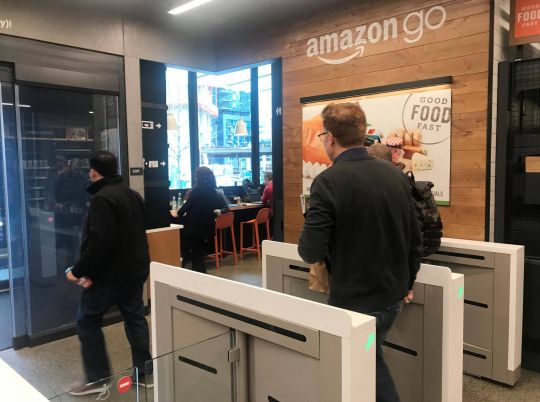By Glenn Taylor, Senior Editor

The Amazon Go convenience store opening in
January 2018 shed light on the
next new shiny concept in retail — cashierless, checkout-free stores.
While Amazon is the biggest player making this push, technology providers such
as Standard
Cognition and AiFi
are building out their own AI-based checkout-free solutions, creating the
potential for competition in the space. But all this news makes me wonder: Just
how feasible is any of this technology at scale?
Even in the case of Amazon Go, the e-Commerce giant used
the Seattle location as a testing ground for more than a year before
opening to the public. This means that Amazon went through a year’s worth of
data, shopper patterns and trials to get its “Just Walk Out” technology right.
While Amazon’s plan appears to be to build
as many as six new stores this year, no plans have been announced about including
the technology in Whole Foods stores.
That seems to indicate that workable deployments in spaces larger than the
1,800-square-foot spot in Seattle are still far in the future.
What makes the concept difficult to scale? For one, there
are approximately 100 cameras on the Amazon Go store ceiling. While the costs
of these cameras (and the Just Walk Out technology itself) hasn’t been
revealed, adding enough cameras to cover a larger footprint would assuredly be
an expense that most retailers aren’t ready for.
And while the idea of “checkout-free” is enticing, self-checkout
can still be a nuisance even as the technology improves. In my experience,
whether at Stop And Shop or CVS, for example, barcode scanners
often need an attendant supervising the process to ensure every item gets
scanned, or to assist if the machine malfunctions. If self-checkout still has
to work out its share of kinks, then checkout-free systems will need human
supervision as well.
Technology like RFID chips and tags have certainly
benefitted retailers seeking to reduce loss prevention in stores and improve
inventory accuracy, but they’re still not perfect. Take this concept and apply
it to a cashier-free checkout experience, and it’s possible that items would
not be detected after shelf removal, creating a potential parade of items
literally walking out of the store. Of course, this appears to be a worst-case
scenario of the technology’s potential failure points, but it shows that there
are still issues to be resolved.
Retailers Can’t
Neglect Workforce If Cashierless Becomes A Reality
Perfecting the technology will create its own repercussions
on the retail workforce.
The Bureau of Labor Statistics said that more than 3.5
million people held cashier jobs as of May 2016, with 867,000 of them
working in grocery stores and 283,920 working in department stores. If cashier
technology improves enough so that fewer cashiers are necessary, retailers would
presumably move (or hire) individuals into
more customer-facing jobs throughout the store, or in the back office to track
merchandise.
I’d hope that any labor cost savings from the technology’s
growth would be used wisely, in more efficient forms of labor within the store
to improve the customer experience. After all, the store experience must retain
some sense of humanity, especially if retailers want to differentiate it from
the online experience.
“AiFi (and other cashierless technologies) will save
customers countless hours, and dehumanize the experience,” said Chris Petersen,
President of Integrated Marketing Solutions in a RetailWire discussion. “Customer
experience is situational and depends upon context. When the shopper knows
exactly what they want, and speed is at the top of their list, AiFi-type stores
provide convenience and value. However, when shoppers are less sure about
choices or need assistance in making selections (e.g. apparel or technology)
knowledgeable staff become highly valued. There is no single best solution for
every situation or customer scenario. The best advice for retailers selling ‘high
touch’ products and services is to double down on staff who can differentiate
experience in-store as well as service after the sale.”






